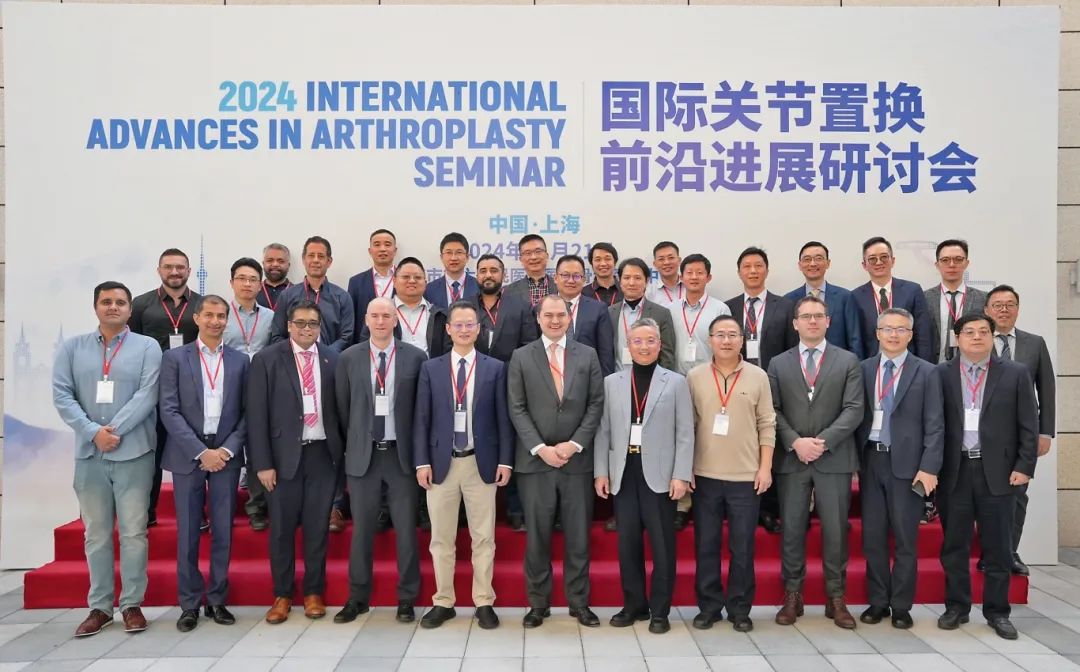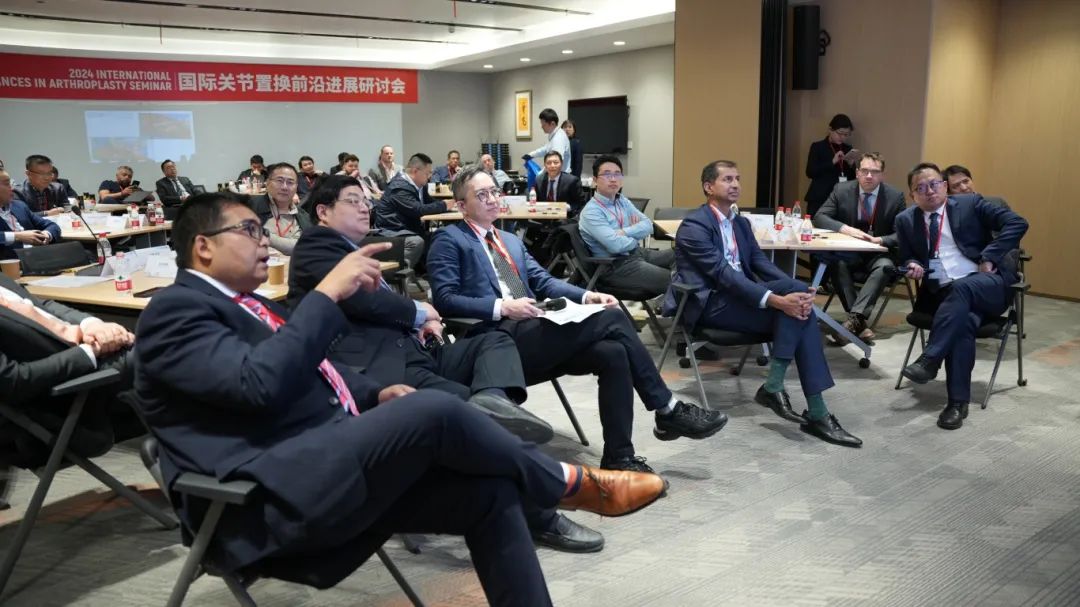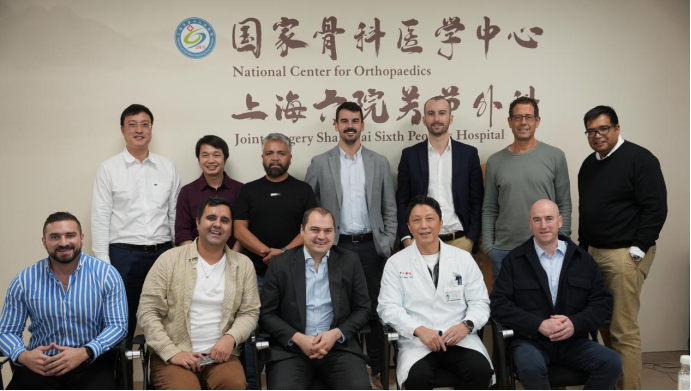
On November 21-22, 2024, the 2024 IAIAS was held at the National Orthopedic Medical Center of the Sixth People's Hospital of Shanghai. The conference was divided into an academic discussion topic on the afternoon of November 21 and a surgical demonstration topic on November 22.
This academic feast, which brought together about 60 renowned experts and professors from the UK, Mexico, Spain, Israel, Vietnam, and China, not only demonstrated the spirit of medical cooperation without borders, but also showcased the latest research achievements and technological trends in the field of joint replacement.

Professor Chen Yunsu from the Department of Joint Surgery at the National Orthopedic Medical Center of Shanghai Sixth People's Hospital presided over the opening ceremony. Professor Chen Yunsu would like to express his gratitude to the global orthopedic experts who have attended this conference. He hopes to use this conference to promote the development and popularization of joint surgery and intelligent technology in the international orthopedic field.
Professor Zhang Xianlong, Executive Vice Director and Director of Joint Surgery at the National Orthopedic Medical Center of Shanghai Sixth People's Hospital, delivered the opening speech. He warmly welcomed medical colleagues from all over the world and was delighted to be here with everyone. Shanghai is a city with openness and innovation. Shanghai Sixth People's Hospital is a national orthopedic medical center, representing the highest level of orthopedic diagnosis and treatment in China.
Professor Zhang Xianlong emphasized that the high and leading position of a discipline lies in its continuous promotion of innovative training, learning exchanges, and particularly important external exchanges. That's also why we established a seminar like IAIAS and chose Shanghai as our first location. Aiming to enhance the free exchange and in-depth discussion of new developments in orthopedic joint surgery on academic platforms, which will help establish good international cooperation relationships in the future, deepen international cooperation and exchanges, and better serve orthopedic patients worldwide.
This conference focuses on the pain points, difficulties, and the latest digital technologies in the diagnosis and treatment of bone and joint diseases such as infection, revision and customization, and digital intelligence. We believe that this academic feast will enable everyone to fully share and learn more valuable experiences and insights.
Professor Alexander David Liddle from the Department of Orthopedics at Imperial College London Hospital expressed his sincere gratitude to the organizer, Shanghai Sixth People's Hospital, in his opening speech. He felt honored to be invited to participate in the 2024 International Symposium on Frontiers in Joint Replacement.
At the same time, he lamented the rapid development of joint replacement technology in China in recent years. Despite the differences in language and culture between China and the UK, they are now facing similar clinical challenges such as infection and revision. I hope to have in-depth exchanges with doctors from various countries through this conference, jointly explore solutions to complex problems and the latest digital advances in joint replacement surgery technology, and look forward to future international exchanges and cooperation.
Professor Ma Xin, Secretary of the Party Committee of Shanghai Sixth People's Hospital and Director of the National Orthopedic Medical Center, first introduced his overseas study and exchange experience as an ankle surgeon in his speech, affirming the importance of international exchange for orthopedic doctors, which can effectively enhance their professional knowledge and international vision.
Secondly, he thanked Professor Zhang Xianlong for his outstanding contributions to the Department of Joint Surgery at Shanghai Sixth Hospital. As the National Orthopedic Medical Center of China, the hospital has played an important role in the development of orthopedic surgery in China, and the center has also taken the hospital to a new international first-class height. I believe that doctors from all over the world can gain a lot from this conference, collide with different orthopedic wisdom sparks, deepen the friendship of international orthopedic experts, and promote international interdisciplinary progress.
Finally, he hopes to deepen exchanges and cooperation with experts from around the world through the platform of the National Orthopedic Medical Center, jointly promote international innovation and development of orthopedic surgery technology, enhance the ability to treat difficult cases, and benefit more patients worldwide.
The conference is rich and colorful, divided into three topics, each closely related to the current hot and difficult topics in the field of joint replacement.
Under the guidance of Professors Yue Bing and Wang Qi, the attendees had in-depth discussions on the thorny issue of infection after joint replacement surgery. Professor Shen Hao opened with a presentation on "Phase II Reconstruction Strategies for Chronic Infection of Knee Joint Prostheses", while Professor Jeya Palan brought a cutting-edge presentation on "Current Concepts in Peripheral Joint Infections from Diagnosis to Treatment", providing attendees with new diagnostic and treatment ideas. Professor Wang Qiaojie shared "DAIR combined with VSD treatment for acute artificial joint infection", and Professor Praveen Panose shared "Prostatic Joint Infection", bringing valuable practical experience to the attending experts.

During the roundtable discussion session, Professor Jeya Palan, Professor Shen Hao, Professor Li Guodong, Professor Panose Praveen, and Professor Chai Wei were invited as special guests to discuss and share their research results and clinical experience on the issue of infection after joint replacement surgery, bringing exciting academic content to the attending experts.
Professor Feng Bin and Professor Wang Qiaojie co chaired the renovation and customization special section. Professor Chen Yunsu's sharing of "Acetabular Deficiency in Revision THA Management Strategies" provides a reference for revision surgery of acetabular bone defects. The application of 3D printing in the reconstruction and repair of complex acetabular bone defects shared by Professor Huang Wei demonstrates the infinite possibilities of 3D printing technology in the field of orthopedic joints. Professor Li Huiwu shared a case of complex knee joint treatment, and Professor Xie Jie shared a discussion on personalized customized knee joint revision cases.
In the subsequent roundtable discussion session, Professor Chen Yunsu, Professor Huang Wei, Professor Alexander David Liddle, and Professor Zhong Da were invited as special guests to discuss the technical difficulties of revision surgery, the latest trends in personalized customization, and the possibility of international cooperation based on the cases shared by the previous two professors.
The special section on digital intelligence is chaired by Professor Qian Wenwei and Professor Shen Hao. Professor Wang Qi's sharing of "What can robot assisted THA technology bring us?" sparked deep reflection among the attendees at the scene. Professor Yaron Berkovich's "Why I use knee robots" presentation at Carmel Medical Center in Israel showcased the unique advantages of robotics technology in knee replacement surgery. Professor Chai Wei's "Sharing of Cases Using Digital Technology to Solve Complex Hip Surgery" and Professor Jonathan Hutt's "The Benefits of 3D Planning in Complex Arthroplasty" speeches have fully demonstrated the potential of digital technology.
Professors Zhang Xianlong, Yaron Berkovich, Liu Wanjun, Wang Qi, and Wu Haobo were invited as special discussion guests to conduct in-depth discussions on topics such as the application of digital intelligence in joint replacement surgery, technological innovation, and future trends, expanding the direction of intelligent development in orthopedic medical care.
The meeting came to a successful conclusion in Professor Zhang Xianlong's closing summary. He highly praised the achievements of this conference and emphasized the importance of international cooperation and exchange in promoting medical technology progress. At the same time, he also expressed sincere gratitude to the participants for their active participation and contributions, and looked forward to more such platforms in the future to promote close cooperation and exchange among global medical colleagues, and jointly contribute more wisdom and strength to the cause of human health.
Prior to the surgical demonstration on the 22nd, Professor Wang Qi first introduced the historical evolution, technological achievements, and international influence of Shanghai Sixth Hospital and Joint Surgery to all attending foreign experts, emphasizing the hospital's unremitting efforts and significant contributions in promoting the progress of joint replacement technology.
Subsequently, Professor Wang Qi gave a demonstration of VTS visualization intelligent assisted navigation system for hip joint surgery, Professor Shen Hao gave a demonstration of ACCK II knee joint surgery, and Professor Chen Yunsu gave a demonstration of SR II hip joint surgery. Under the leadership of Professor Wang Qiaojie, during the surgical demonstration, not only did he share the experience of six hospitals in complex joint replacement surgery, but also promoted in-depth exchanges and discussions among domestic and foreign doctors in joint surgery techniques.
After the surgical demonstration, Professor Chen Yunsu summarized and concluded the two-day Shanghai Sixth Hospital Joint Surgery Exchange Activity successfully. This activity encouraged the collision of innovative thinking and practical experience, and jointly explored the latest developments in joint replacement technology. We hope that all foreign colleagues can gain something and return with a full load.
